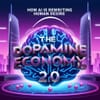OpenAI's decision to allow ChatGPT to generate erotic content for adults marked a significant shift in the digital landscape. This move, while seemingly pragmatic, signals a deeper transformation in how technology engages with human desire. Rather than merely capturing attention, AI now monetizes the very essence of longing and anticipation, creating a new economic model where desire itself becomes the commodity.
Historically, digital platforms thrived by exploiting users' attention spans, delivering content designed to trigger dopamine-driven engagement. However, AI's personalized interactions have introduced a more profound dynamic. By tailoring responses and adapting to individual preferences, AI fosters a continuous cycle of craving and fulfillment, where the experience of wanting becomes as valuable as the content itself.
This evolution challenges traditional notions of intimacy and connection. AI-generated interactions offer the illusion of companionship without the complexities of human vulnerability and risk. While this may provide immediate gratification, it raises concerns about the erosion of genuine emotional experiences and the potential atrophy of the neural pathways associated with real human connection.
As AI continues to shape the landscape of human desire, it becomes imperative to consider the implications of this shift. The commodification of longing and the blurring of lines between authentic and synthetic experiences prompt critical questions about the future of human relationships and the ethical considerations surrounding AI's role in our emotional lives.


